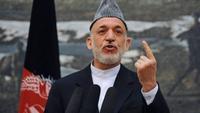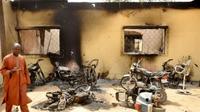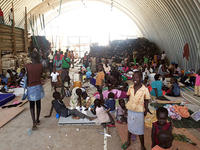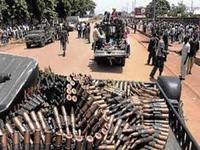-
U.S. concerned about Karzai’s plan to release dozens of militants

Just a few months after American officials transferred control of all detention operations in Afghanistan to Afghan forces, President Hamid Karzai’s administration has decided to release dozens of prisoners, despite objection from American and Afghan officials.
-
-
Central African Republic, already mired in ethnic violence, faces another threat: famine

Since last year, when they had to flee the intensifying violence across the Central African Republic, farming communities had to abandon their fields along the main roads to replant deep in the bush. This disruption led them to produce much less than in previous years, with a major impact on their food reserves, which will last till February instead of July. The success of the next planting season crucially hinges on the return of farming families to the fields. Families who are unable to plant in March will have to wait one whole year before they can hope to harvest again. Failure to plant in March will have dire consequences for the food security of the Central African Republic’s population.
-
-
Volgograd under lockdown as Winter Games security worries grow
Volgograd has been placed under tight security after a Monday suicide bombing on trolleybus killed sixteen, one day after seventeen people were killed at a train station. For the Russian government, the attacks represent the worst possible scenario: an orchestrated bombing campaign during the run-up to the Winter Olympics – and during the games themselves — in a region too big, and with too many soft targets, to be secured effectively. Such a broad and well-coordinated terror campaign will overshadow – and might even seriously disrupt — the biggest international event on Russian soil since the 1980 Moscow Olympics.
-
-
Nigeria wants Cameroon’s help on Islamic insurgency

Nigeria has a problem: in the face of growing military campaign by the federal government against Islamist insurgents n three states in north-east Nigeria, some of the insurgents have found it safer to relocate to neighboring Cameroon. They launch their attacks against targets in north-east Nigeria – then retreat to the safety of Cameroon, where they know the Nigerian military will not pursue them. Nigeria wants Cameroon to take a more active role in preventing Islamist insurgents from using Cameroon’s territory as a safe haven.
-
-
Deepening ethnic violence in South Sudan may ultimately tear the new country apart

Following last week’s announcement by President Salva Kiir of South Sudan that his government had foiled a coup attempt by his former vice president, Riek Machar, the country has been plunged into uncertainty. Escalating violence has already claimed hundreds of lives in the capital Juba. Thousands have fed the capital, seeking safety in remote rural areas of the country. Kiir belongs to the Dinka tribe which is the largest ethnic group in the country, with about 15 percent of the population. Machar is a Nuer, the second largest group with about 10 percent of the population. In the capital, Dinka-led South Sudanese forces have targeted members of the Nuer ethnic group, killing many and detaining others, including soldiers, lawmakers, and students. Outside the capital, in Jonglei State, Nuer militiamen have been targeting Dinka civilians and attacking oil fields.
-
-
New terrorist faction threatening U.S. interests in the Sahel
The State Department on Wednesday warned that a new terrorist group linked to an Algerian militant is now posing “the greatest near-term threat to U.S. and Western interests” in the Sahel region of Africa. U.S. is concerned with Mokhtar Belmokhtar, an Algerian militant who has been conducting terrorist operations in the Sahel region for a while. The Sahel is vast, sparsely populated desert area on the southern reaches of Sahara desert, stretching from Senegal in the west to Chad in the east.
-
-
Two Guantanamo detainees sent to Algeria over their objections
The Defense Departmentannounced earlier this month that it had repatriated two Guantánamo Bay detainees to Algeria despite requests from both men to halt the transfers because of fear of persecution. The repatriations were announced a day after the Pentagon said that a Sudanese man would be repatriated to Sudan after serving a portion of his sentence as required by a pretrial agreement. Human rights advocates criticize the move based on humanitarian grounds, while conservative groups consider the transfer as a national security risk. Both detainees arrived at Guantanamo in 2002 – one was arrested in Pakistan, the other in Bosnia.
-
-
First French casualties in the Central African Republic highlight mission’s difficulties
Last week, less than a week after their arrival, two French soldiers were killed in the Central African Republic (CAR). The incident highlights the difficulty French troops face in an unstable country teetering on the brink of total chaos, and where international observers are worried about possible genocide, reminiscent of the Rwandan genocide in the 1990s.
-
-
Cold War to cyber war, here’s how weapon exports are controlled
It was reported last week that the U.K. government is pushing for new restrictions on software — in particular, on tools that would prevent surveillance by the state. This was the focus of negotiations to incorporate cyber security technologies into the Wassenaar Arrangement on Export Controls for Conventional Arms and Dual-Use Goods and Technologies. Wassenaar was born of the Cold War in 1996. The idea was to inhibit the Soviets (and Chinese) by preventing the export of military equipment and the technology that could be used to make, maintain or defeat that equipment. The push to include cybersecurity in Wassenaar negotiations is unlikely to be effective but will reassure nervous politicians and officials.
-
-
EU to fund improved C3IS capabilities for African-led security operations
The EU on Friday confirm it will provide 12.5 million euros through its African Peace Facility to improve the command, control, communication, and information system (C3IS) used in African-led peace support operations. Since 2004 the EU has provided 1.1 billion euros to support peace and security operations in Africa.
-
-
Africa’s Sahel region threatened by terrorism, organized crime: Ban Ki-moon
Terrorism, trafficking in arms, drugs, and people, and other transnational forms of organized crime are threatening security in Africa’s vast sub-Saharan Sahel region, Secretary-General Ban Ki-moon warned the Security Council yesterday. He called for continued strengthening of The UN Multidimensional Integrated Stabilization Mission in Mali (MINUSMA), a 12,600-strong force set up by the Council in April and authorized “to use all necessary means” to carry out security-related stabilization tasks, protect civilians, UN staff, and cultural artefacts in the cou8ntry, and create the conditions for provision of humanitarian aid.
-
-
EU issues new manual for defending ICS against cyberattacks
ENISA, the EU’s cybersecurity agency, has issued a new manual for better mitigating attacks on Industrial Control Systems (ICS). ICS support vital industrial processes primarily in the area of critical information infrastructure such as the energy and chemical transportation industries, where sufficient knowledge is often lacking. As ICS are now often connected to Internet platforms, additional security preparations must be taken. ENISA says that the new guide provides the necessary key considerations for a team charged with ICS Computer Emergency Response Capabilities (ICS-CERC).
-
-
U.S. aircraft to fly African troops to the Central African Republic mission
U.S. military aircraft will fly African and European peacekeepers to the Central African Republic to help contain a bloody internal conflict between Christian and Muslim militias and other rebel factions. The country has been in chaos since Muslim militias ousted President Francois Bozize in March. The initial mission of the U.S. transport planes will be to fly troops from Burundi to the Central African Republic capital of Bangui.
-
-
Is the time finally right for a pan-African security force?
Representatives of fifty-three African states, meeting at an African summit in Paris last week, emphasized the need for a pan-African military force. Observers note that this is not a new idea – it was first raised Ghana’s first president Kwame Nkrumah in 1963 — but that on those few occasions when efforts were made to translate the idea into reality, it has never worked. Notwithstanding the many failures of the past, and the many warning signs of the present, many African leaders and observers are optimistic that this time, the 50-year old dream of a pan-African military force may well be realized.
-
-
UN approves intervention in Central African Republic as violence rages

The UN Security Council yesterday voted for a resolution, put forward by France, which authorized an African Union-led peacekeeping force to intervene in the Central African Republic to prevent the growing chaos from causing the state to disintegrate. The AU force, with the support of French forces, will protect civilians, restore humanitarian access, and stabilize the country. UN officials have warned that the violence between the Christian majority and Muslim minority now in power could lead to genocide.
-
- All
- Regional
- Water
- Biometrics
- Borders/Immig
- Business
- Cybersecurity
- Detection
- Disasters
- Government
- Infrastructure
- International
- Public health
- Public Safety
- Communication interoperabillity
- Emergency services
- Emergency medical services
- Fire
- First response
- IEDs
- Law Enforcement
- Law Enforcement Technology
- Military technology
- Nonlethal weapons
- Nuclear weapons
- Personal protection equipment
- Police
- Notification /alert systems
- Situational awareness
- Weapons systems
- Sci-Tech
- Sector Reports
- Surveillance
- Transportation
Advertising & Marketing: advertise@newswirepubs.com
Editorial: editor@newswirepubs.com
General: info@newswirepubs.com
2010-2011 © News Wire Publications, LLC News Wire Publications, LLC
220 Old Country Road | Suite 200 | Mineola | New York | 11501
Permissions and Policies
Editorial: editor@newswirepubs.com
General: info@newswirepubs.com
2010-2011 © News Wire Publications, LLC News Wire Publications, LLC
220 Old Country Road | Suite 200 | Mineola | New York | 11501
Permissions and Policies
